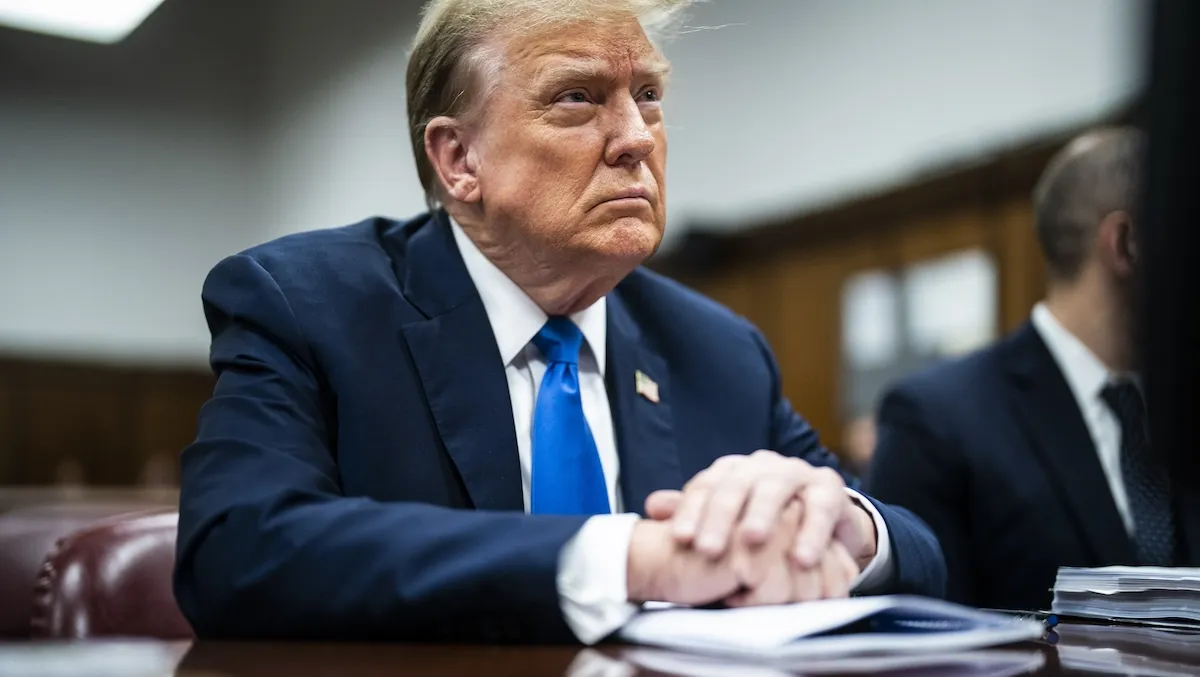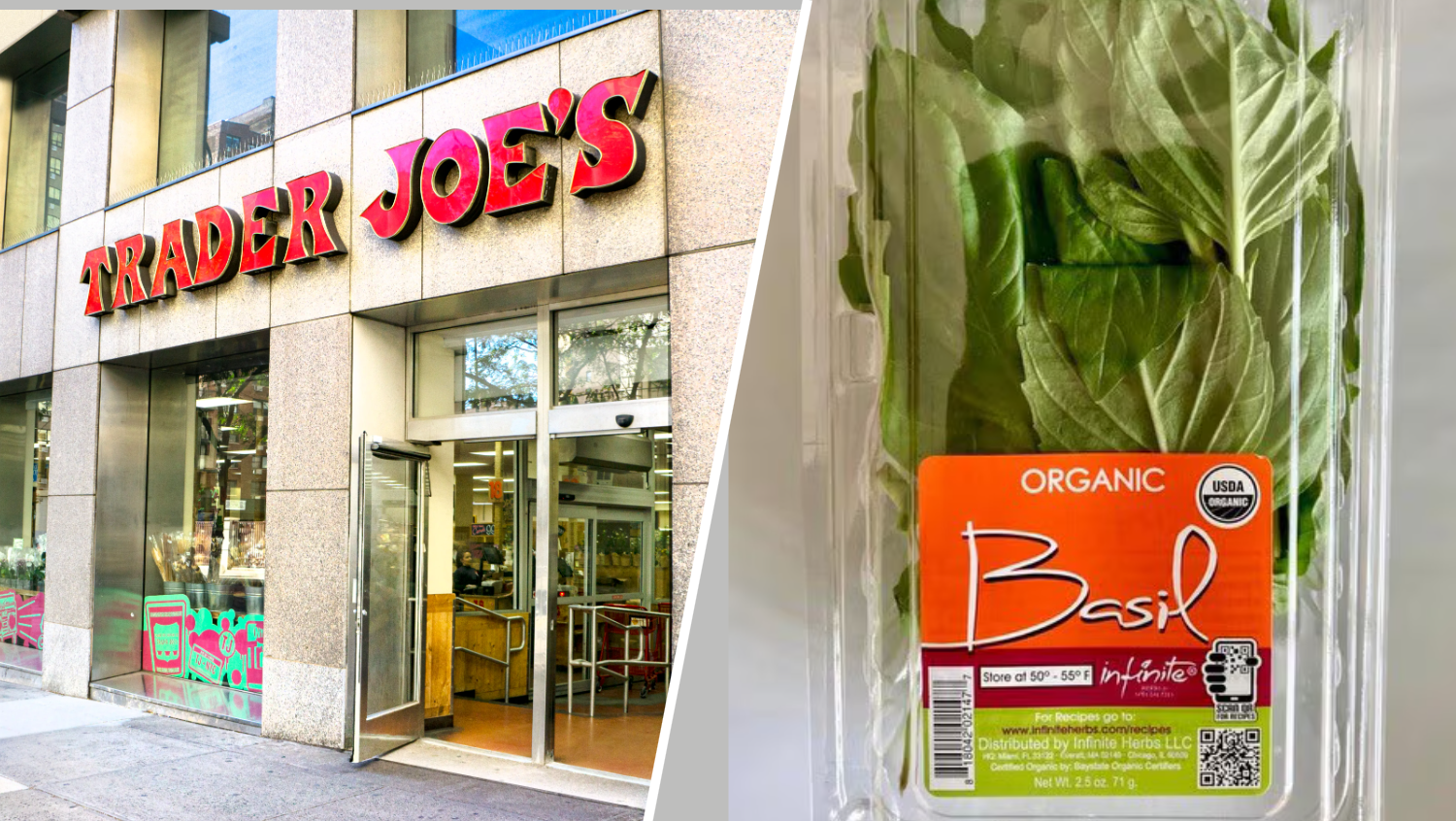What to Know
- New York opened vaccine eligibility to those age 30+ Tuesday and will extend it universally to those age 16+ on April 6; about 17% of the state's population has been fully vaccinated to date
- The presence of highly contagious COVID variants has stoked U.S. concern; NJ officials outlined new virus projection models that suggest those may contribute to potential record daily cases in May
- Meanwhile, the reopening process continues, with Gov. Andrew Cuomo's domestic travel quarantine rule ending Thursday, the same day the Yankees host fans in the stands and outdoor concerts return
As Gov. Andrew Cuomo prepares to drop New York's longstanding quarantine requirement for domestic travelers in less than 24 hours, New Jersey officials are warning the increasing prevalence of highly contagious coronavirus variants could send new daily case totals in the Garden State to record levels by mid-May.
Gov. Phil Murphy and top state health officials on Wednesday outlined updated moderate- and high-case virus projection models that take the impacts of vaccination, spring break travel, future holidays and vaccine efficacy against variants into account. Both models assume New Jersey vaccinates 70 percent of its adult population in June, though the dates are two weeks apart.
In the moderate-case scenario, which presumes current vaccines have 95 percent efficacy against variants and New Jersey adults are 70 percent vaccinated by June 1, the latest wave would peak around April 18 with a daily high of 5,445 daily cases and nearly 2,700 people hospitalized. Both those numbers are more than double what the state was reporting in early November.
Get Tri-state area news and weather forecasts to your inbox. Sign up for NBC New York newsletters.
The state wouldn't expect to see new daily cases drop below 3,000 until mid-June at the earliest. That means more than 2,000 new cases a day, every day, for at least another four months. Hospitalizations would top 1,000 until at least August.
And that's the moderate scenario.
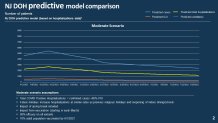
In the worst case, modeling shows that peak may not come until May 18, when daily case highs could top 8,160 -- more in a single day than New Jersey has reported since the pandemic started -- while hospitalizations would top off around 3,650, an admission volume the state hasn't seen since mid-May 2020. Both "unsettling" highs could persist well into mid-June in that model, Murphy noted.
News
"Basically, we would be plus or minus back to where we were in December and January when the second wave was crashing on us," he said.
That more dire model presumes 65 percent vaccine efficacy on coronavirus variants and high spread impact connected to them. It also presumes the 70 percent adult vaccination goal is hit two weeks later than the other model and a higher rate of hospitalizations and new cases stemming from public behavior as well as holiday-related travel and the overall reopening process.
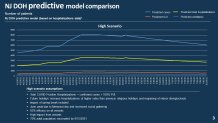
Murphy offered a core caveat at the start of his briefing -- one he says he's given before and one he's obliged to reiterate now.
"While these models are based on a year's worth of data, they do change practically day-to-day as new data better informs our path forward. These are projections, not certainties -- and through our behavior we can change the trajectory of the models," he said. "The more vaccinations we administer, the better we can make the model. And the more we continue to wear our masks and keep social distances even after we've been vaccinated, we can further push these projected numbers lower."
"While the numbers of projected new cases can and should give us all pause, it is the numbers in our hospitals which are of the greatest concern when it comes to determining the steps we need to take as a state," the governor added.
Some of those hospitalization metrics have been rising already, New Jersey Health Commissioner Judy Persichilli shared data that shows a 28 percent jump in new admissions statewide in the last two weeks. That includes a 31 percent increase in hospitalizations among those age 20 to 29, a 9 percent increase in those 30 to 39 and a 48 percent increase among those 40 to 49, she said.
Hospitalizations for those older than 70 have been markedly less, 7 percent for the 70-79 group and 1 percent for those older than 80, Persichilli added, possibly a reflection of early vaccine eligibility targeting elderly populations.
"It is believed that the uptick in cases is due primarily to more contagious variants, for example, B.1.1.7, the U.K. variant, coupled with less cautious behaviors," the state's health commissioner said. "There is still an uncertainty ahead with this relentless virus that continues to change. All of the country is in a race to vaccinate as variants contribute to the surges."
The heightened prevalence of more transmissible variants first identified in the U.K., Brazil and South Africa has officials at all levels of government and as high-ranking as the president warning states not to loosen restrictions too aggressively. A half-dozen states have already lifted mask mandates and more are planning to do so in the coming weeks in spite of pleas to Americans from President Joe Biden and CDC boss Dr. Rochelle Walensky to keep their guards up.
While virus mutations are a matter of course and most are not considered threats to public health, the trio from the U.K. (B.1.1.7), South Africa (B.1.351) and Brazil (P.1) are considered "variants of interest" because evidence has shown they are better able to evade immune responses and may increase risk of reinfection.
In its latest update, the CDC said nearly 12,000 cases of the B.1.1.7 variant have been reported in 51 states. The head of the agency said Wednesday that variant now accounts for 26 percent of U.S. cases and is starting to become the predominant strain. Preliminary data from the U.K. suggests that strain could also be more lethal than others, though experts say that needs further study.
The South African and Brazilian strains are less common, accounting for 312 cases in 31 states and 172 cases in 22 states, respectively, the CDC says.
New Jersey tracks seven known variants at the state level. Those have been found in more than 700 positive COVID samples, though the U.K. strain is by far most common (606 known cases). Ten cases of the South African (2) and Brazilian (8) variants have been identified, while the so-called "New York City" variant, known as B.1.526, was detected in 112 samples. Unlike in New York, New Jersey's travel quarantine has always been an advisory, not an enforceable order.
Murphy, whose state is currently No. 1 nationally in new daily cases per capita (New York is No. 2, Connecticut is No. 3), has said his advisory remains in effect.
Connecticut has reported nearly 400 cases of the U.K. strain locally and two and seven of the other two variants of interest. New York state hasn't updated its public accounting of variant data with any regularity, but in the city, health officials say they have found the U.K. variant in at least 590 people. That last update on March 23 marked a 35 percent increase from the previous data release.
City health officials said earlier this month that two variants -- the U.K. one and one that originated in Washington Heights last year (B.1.526) -- accounted for 51 percent of all samples studied in the most recent week of full data. Variants overall accounted for more than 70 percent of city cases for the week starting March 15, the city said, indicating that they may be even more infectious than previously circulating variants.
The vast majority of variant samples identified were the Washington Heights variant, known as B.1.526. That strain was present in more 42 percent of cases studied overall. The U.K. strain, B.1.1.7, has thus far been reported in about 590 New York City residents, a 35 percent increase from the previous data release. One Brazilian strain case and two South African variant cases have been found, though the prevalence of all three is likely much higher than reported.
Asked about the risk of variants, specifically as it relates to any potential for reinfection, on Tuesday, Health Commissioner Dr. Dave Chokshi said some of the strains, particularly the Brazilian and South African ones, "do appear to be able to evade our immune response more-so than the other variants."
"That's something that we are following closely," Chokshi added. "There appears to be evidence that people who get those variants are more at risk of reinfection even if they've had COVID-19 in the past. All of that said, based on our own observation here in New York City, we're not seeing the likelihood of reinfection growing over time."
Reinfection risk aside, the growing volume of variant cases has stoked concern nationally. It's also created preference in public vaccine choices; some worry the Johnson & Johnson single-dose shot, which was clinically tried in variant-dominant countries like South Africa and showed lower effectiveness will, won't work as well against that and other variants in the U.S. The Moderna and Pfizer trials were done much earlier and not subject to the same variant scrutiny.
Both Cuomo and New York City Mayor Bill de Blasio, among other officials, elected to have the J&J shot to underscore the point that all existing vaccines are effective at preventing hospitalization and death from coronavirus.
As Dr. Jay Varma, senior adviser to the mayor's office, reiterated Wednesday, "The best vaccine is the one that you can get right now. It's not about a brand. It's about the outcome."
Dr. Varma sounded optimistic on Wednesday, providing a hopeful outlook for the city.
"There is a very real possibility we can be completely out of this within another six to eight weeks of very aggressive vaccinations, but we do run a risk of having a resurgence," he said.
Overall, health experts say they are expected to work on the variants that have emerged and those that will emerge over time, though some warn viral mutations could render current vaccines ineffective in a year or less, according to CNBC.
The Race to Vaccinate -- and Mass Public Frustration
The race, more of a marathon, to vaccinate has taken on heightened urgency in the last month or so as officials fight to maintain lower hospitalization and death rates while curbing the spread of new cases.
U.S. COVID cases are trending up again, with nationwide infection levels far below January's peak of about 250,000 new cases a day but approaching numbers seen during the summer surge, when average daily case counts hit nearly 70,000.
States are rapidly expanding vaccine eligibility to keep up, including all three tri-states. To date, about 29 percent of the U.S. population has had at least one vaccine dose while 16.1 percent are fully vaccinated, according to the CDC.
New Jersey has fully inoculated about 17.6 percent of its population while nearly 31 percent have had at least one dose. In New York City, 15.8 percent of the population has been fully vaccinated. Statewide, 30.4 percent of New York's population had at least one dose while 17.9 percent report a completed series. Nassau County on Long Island said Wednesday that half of their entire adult population had received at least their first vaccine shot.
New York opened vaccine eligibility to those age 30 and older on Tuesday, an expansion that prompted mass headaches for younger New Yorkers who found themselves refreshing city and state websites continuously for hours only to reach glaring "no appointments currently available" time and again.
Many found the process on both state and city vaccine websites slow. Precious appointments that emerged suddenly vanished just as quickly when they hit schedule. Officials acknowledge their exasperation but encourage patience, as they have done with others for months, and say the experience should improve.
Vaccines for New Yorkers under 30: Here's how to sign up
With eligibility expanding to all 16 and older early next week, the demand for shots will further outweigh the dose supply. As of Wednesday, New York City had fewer than 137,000 first and single-shot doses on hand from the three manufacturers.
Not sure how the process works? Check out our handy tri-state vaccine site finder and FAQs here
New York City and New Jersey Vaccine Providers
Click on each provider to find more information on scheduling appointments for the COVID-19 Vaccine.
Data: City of New York, State of New Jersey • Nina Lin / NBC
Mayor de Blasio says supply should increase in April but he says part of the challenge is trying to bring so many different providers into one unified system.
"If it was all just one agency, this would be a whole different discussion, but it's made complex by the fact that we're using so many different providers in so many different places," de Blasio said. He admitted the system won't be perfect.
Chokshi said the IT team is working on eliminating some redundancy in the process after people complained of having to input their personal information multiple times. More enhancements related to the booking process are expected in the coming days and weeks, he said.
Some residents have tried to take matters into their own hands, turning to tech-savvy people who created their own vaccine finders to make it easier to notify the public when a new appointment slot becomes available.
Websites like turbovax.info, nycvaccinelist.com and NY Covid Vaccine Bot, @nysvaccine and @LongIslandVax have been popular social media sources. Even the people behind those have encountered some challenges.
"When appointments are flying off the shelves like they are now, there is almost no point to sending out a notification," TurboVax tweeted Tuesday. "They will probably be booked by time it takes a tweet to reach your phone."
A new mass state-run vaccination site opens in Rockland County on Thursday, which will add thousands of more appointments to the calendar. Bookings for that site opened at 8 a.m. Wednesday. They were soon completely filled.
Even some who thought they had found a vaccine in Co-op City got some bad news. After arriving expecting a shot, hundreds were told that their appointment had been canceled and the supply for vaccinations was done for the day. The city Health Department said a technical glitch led to the overbooked appointments. A silver lining for those who did show up in hopes of being vaccinated: all were able to schedule appointments in the future to come back and their vaccine at another date.
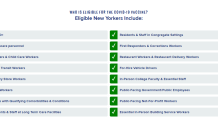
"COVID-19 is still front and center in New York state, and although we continue to make progress vaccinating New Yorkers, it's still a time to practice safe behaviors and care about your fellow citizens. New vaccination sites are opening and eligibility continues to expand, but the infection rate is also a function of what we do to slow the spread," Cuomo said in a statement Wednesday. "Washing hands, wearing masks and socially distancing are important tools we can use to protect each other from this virus. We're going to defeat COVID and return to more fulfilling lives together, but in the meantime everyone needs to stay vigilant."
Murphy has yet to set a date to expand access universally in New Jersey, as the governors of New York and Connecticut have done. On Monday, he added another group of essential workers to the pool. Starting April 5, New Jerseyans age 55 to 64 and anyone 16 or older with developmental disabilities will earn eligibility.
The governor also launched a new beta version of New Jersey's vaccination appointment finder Wednesday to help simply the process.
President Biden announced this week that 90 percent of U.S. adults will be eligible for vaccination by April 19 -- and have a site within five miles of home by that date. The plan is contingent upon expanding vaccine access at retail pharmacies, which thus far have only been permitted to inoculate people 60 years and older, teachers and more recently, individuals with underlying conditions.
Coronavirus was the third leading cause of death among Americans in 2020, killing more people than accidents, strokes, chronic respiratory disease, Alzheimer's, diabetes, influenza and pneumonia, the CDC said Wednesday.

